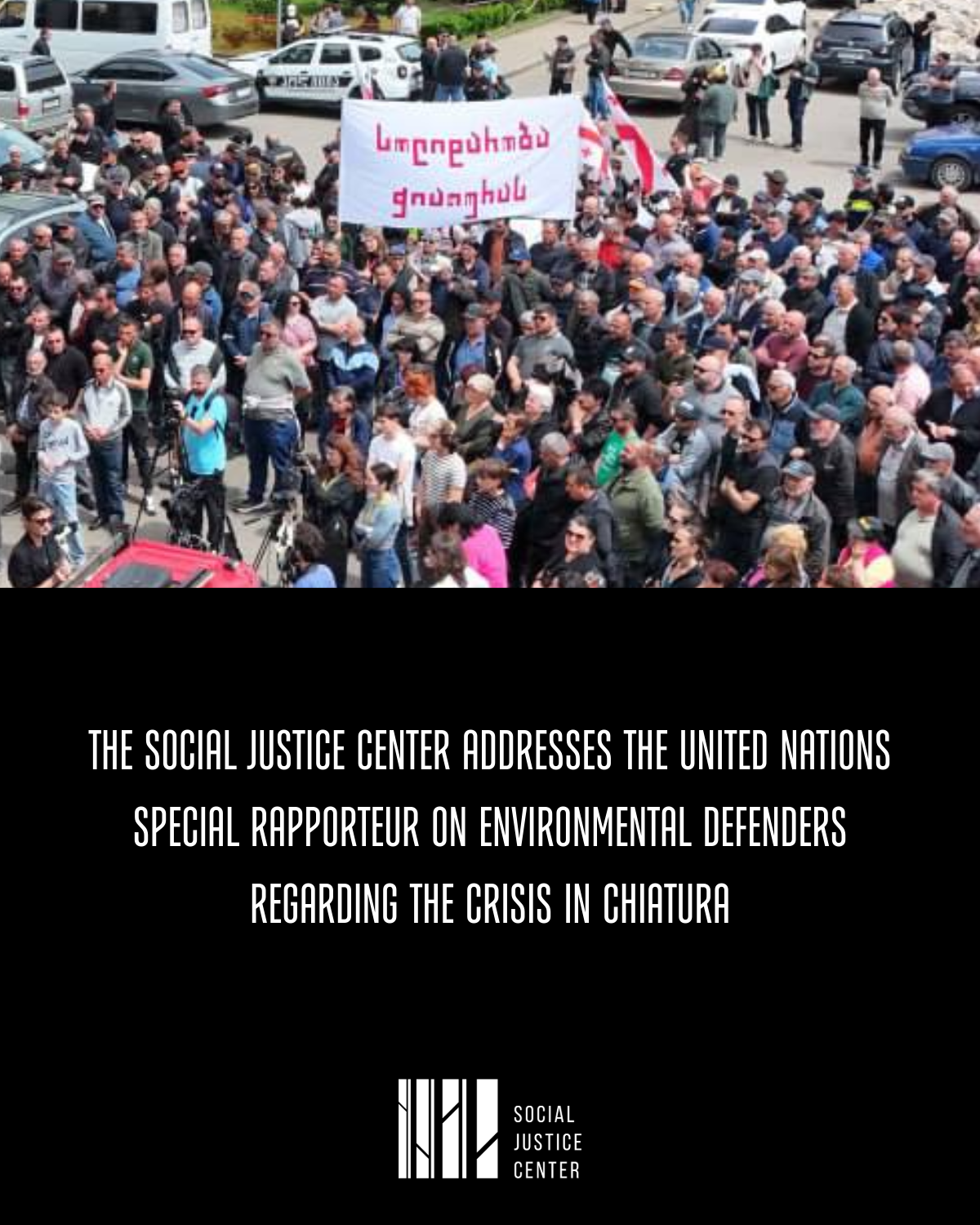საერთო ცხელი ხაზი +995 577 07 05 63


The Social Justice Center has submitted a complaint to the mechanism provided by the Aarhus Convention[1] — the Special Rapporteur on environmental defenders. The complaint was sent on behalf of the activist Giorgi Neparidze, who is currently being held under criminal charges.
The Social Justice Center’s communication concerns the manganese extraction by the Georgian Manganese in Chiatura municipality, which has caused significant damage to the environment and to local residents. Amid the company’s gross violations of the rights of the population and the state’s complete disregard for the challenges faced by Chiatura, activists are fighting against systemic oppression. For this, they are being punished and falling victim to persecution and harassment.
It should be reminded that the Georgian Manganese obtained a 40-year license for manganese extraction in Chiatura in 2006. The company carried out underground mining activities in various locations, including in the area of the village of Shukruti, which led to land subsidence and substantial damage and destruction of homes. Roads, a school, churches, and a cemetery were also damaged, and the environment was polluted. Moreover, violations of labor safety regulations have cost workers their lives and health.
As a result of the extraction activities by the Georgian Manganese, the immovable property (houses and land) of up to 150 families in Shukruti was damaged. Nevertheless, for years the company managed to avoide fully and fairly compensating the people for the harm it had caused, leaving them practically homeless. On the contrary, the Georgian Manganese provided compensation, in accordance with a preliminary agreement, to only 5 or 6 households out of the approximately 33 that participated in the protest. Some families received partial compensation, while 18 households received no compensation at all.
The local population have been protesting the crisis in Chiatura and the gross violations of their rights for several years now. At various times, they have held demonstrations both in Chiatura and Tbilisi, resorting to extreme forms of protest such as hunger strikes and lip sewing. The protest gained renewed momentum in March 2024 near the entrance of the “Korokhnali” mine — locals blocked access to the mine and demanded that negotiations be initiated with the company and that adequate compensation be provided to all those affected.
Instead of planning and implementing measures focused on the needs of the local population, the company and the Georgian Dream employed various formal and informal methods to weaken the protest. Specifically, in 2024, for blocking the entrance to the mine, criminal proceedings were initiated against three protest participants under Article 226 of the Criminal Code of Georgia (organizing or actively participating in a group action that disrupts public order), which provides for imprisonment of up to three years.
In 2025, criminal proceedings were also initiated against four protest participants under Article 225 of the Criminal Code, which concerns organizing, orchestrating, or participating in group violence. The court ordered their pre-trial detention as a preventive measure.
Alongside this coercive measure, the company also filed a Strategic Lawsuit Against Public Participation (SLAPP) with the Sachkhere District Court, seeking to prohibit protest participants from engaging in activities that interfere with the company’s operations. The court upheld this request. In August 2024, the company filed another lawsuit against 30 individuals, seeking compensation for damages it claimed to have suffered, and requested a temporary measure — the freezing of their assets. The court granted this request without proper substantiation.
Another tactic used to suppress the protest was the unjustified firing of five miners, which had a severely detrimental impact on their and their families’ well-being. It is important to note that the company’s actions did not stop there. In March of this year, the Georgian Manganese announced that underground mining operations would cease, pushing Chiatura into a socio-economic crisis. Moreover, in April, the company announced a reorganization process to be led by Russian oligarch Mikhail Sotsky. As a result of the reorganization, on May 19, miners participating in the ongoing mass protest in Chiatura were declared “permanently terminated employees.” This decision effectively condemned the miners and their families to hunger and the risk of losing their homes due to unpaid loans.
Despite the severe challenges facing the people of Chiatura, the state has failed to take any steps to support them. On the contrary, it has repeatedly chosen to abandon the workers to face the company alone. This is hardly surprising given that representatives of the Georgian Manganese and persons affiliated with the company are supporters and major donors of the Georgian Dream and themselves receive numerous benefits from the state. Due to these and other systemic problems, the Social Justice Center, on behalf of Giorgi Neparidze, calls for the unhindered exercise of freedom of assembly and expression by environmental defenders, the termination of criminal proceedings against Giorgi Neparidze, and the establishment of a safe environment in the country for the activities of environmental defenders.
It is worth noting that the mechanism of the Special Rapporteur on environmental defenders was established under the Aarhus Convention to protect the legal status of environmental defenders and activists, to review thematic complaints promptly and effectively, to adopt immediate protective measures, and to raise problematic issues before governments and relevant human rights bodies.
The Social Justice Center is committed to continue to defend the rights and interests of the miners in Chiatura and, more broadly, the local population, and will periodically update the public on the developments.
[1] United Nations Economic Commission for Europe (UNECE) Convention on access to information, public participation in decision-making and access to justice in environmental matters.
The website accessibility instruction